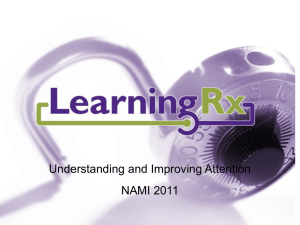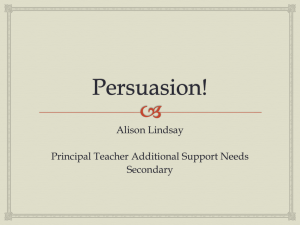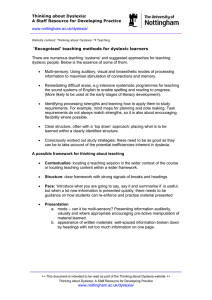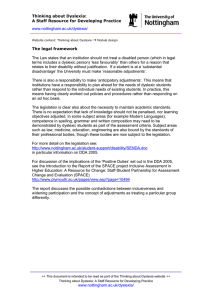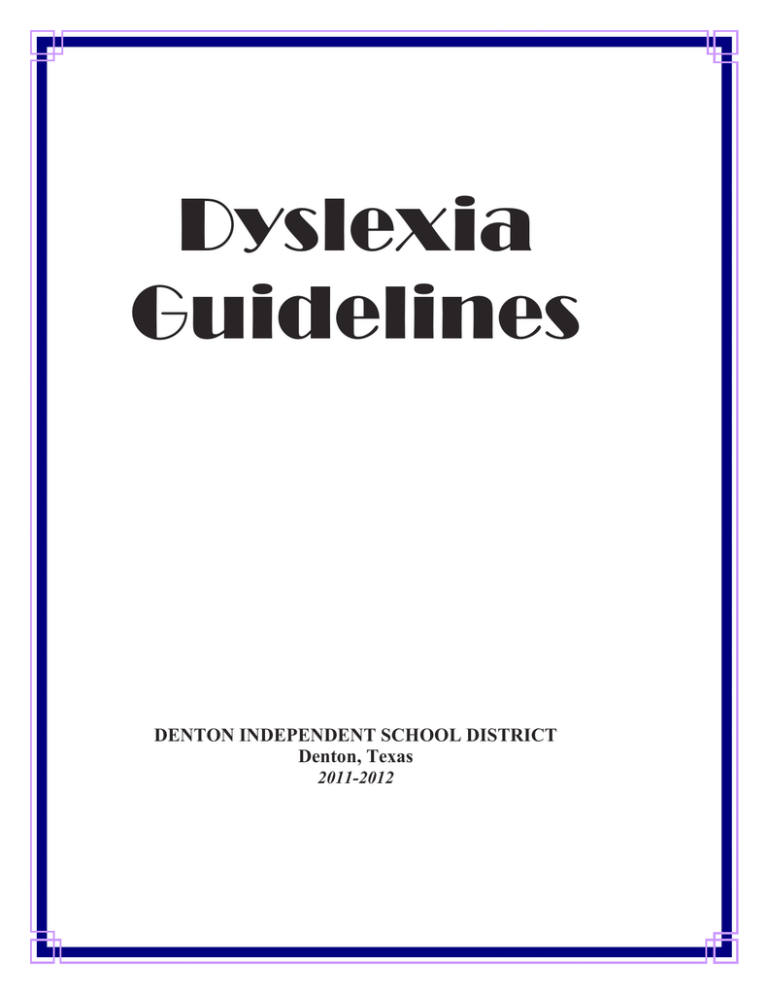
Dyslexia
Guidelines
DENTON INDEPENDENT SCHOOL DISTRICT
Denton, Texas
2011-2012
Denton Independent School District
Dyslexia Program
Table of Contents
I. Denton ISD Dyslexia Program Philosophy
2
II. Common Evidence of Dyslexia
3
III. Pathway to the Identification of Dyslexia
4
IV. Definition of Dyslexia and State Laws for Identification
Of Students with Dyslexia
5
V. Denton ISD Dyslexia Referral Process: Pre-Referral & Referral
6
VI. §504 Committee Decision Points for Identification of Dyslexia
10
VII.
Considerations for §504 Committee
12
VIII.
Transfer Student Procedures
13
IX. Delivery of Dyslexia Services
14
X. Dyslexia Grading Policy
15
XI. Criteria for Dismissal
16
XII.
Forms
17
XIII.
Resources
27
1
Denton Independent School District
Dyslexia Program
Philosophy
Children learn to read, write and spell in different ways. A balanced reading program should meet the
needs of most students. Students, who do not learn to read, write and spell when presented with a broad,
balanced literacy program should be offered a variety of alternative strategies to meet this goal. If these
alternative strategies are not successful, the student may have a reading disorder, sometimes known as
dyslexia. Students who exhibit signs of dyslexia may need intervention treatment in order to be successful
in school. Denton Independent School District offers a dyslexia program to students who meet the
eligibility criteria. The Multisensory Teaching Approach (MTA) coupled with best practices from the
Alphabetic Phonics and Take Flight Programs are used as the intervention model. Students identified as
being dyslexic will be given support and appropriate modifications and/or accommodations in order to be
successful in their academic programs.
2
Denton Independent School District
Dyslexia Program
Common Evidence of Dyslexia
The following may be associated with dyslexia if they are unexpected for the individual’s age, educational level, or
cognitive abilities.
Pre-school
May talk later than most children
May have difficulty with rhyming
May have difficulty pronouncing words (i.e., busgetti for spaghetti, mawn lower for lawnmower)
May have poor auditory memory for nursery rhymes and chants
May be slow to add new vocabulary words
May be unable to recall the right word
May have trouble learning numbers, days of the week, colors, shapes, and how to spell and write his or her
name
Kindergarten through Third Grade
Fails to understand that words come apart; for example, that snowman can be pulled apart into snow and
man and, later on, that the word man can be broken down still further and
sounded out as /m/ /ă/ /n/
Has difficulty learning the letter names and their corresponding sounds
Has difficulty decoding single words (reading single words in isolation)—lacks a strategy
Has difficulty spelling phonetically
Reading choppy and labored
Relies on context to recognize a word
Fourth Grade through High School
Has a history of reading and spelling difficulties
Avoids reading aloud
Reads most materials slowly; oral reading is labored, not fluent
Avoids reading for pleasure
May have an inadequate vocabulary
Has difficulty spelling; may resort to using less complicated words in writing that are easier to spell
Sources for Common Evidence of Dyslexia:
Common Signs, (n.d.).Retrieved July 10, 2006, from The International Dyslexia Association Web site.
3
Denton Independent School District
Dyslexia Program
Pathway to the Identification of
Dyslexia
4
Denton Independent School District
Dyslexia Program
Definition of Dyslexia and State Laws for Identification of Students with Dyslexia
The working definition of the International Dyslexia Association states:
Dyslexia is a specific learning disability that is neurological in origin. It is characterized by
difficulties with accurate and/or fluent word recognition and by poor spelling and decoding abilities.
These difficulties typically result from a deficit in the phonological component of language that is often
unexpected in relation to other cognitive abilities and the provision of effective classroom instruction.
Secondary consequences may include problems in reading comprehension and reduced reading
experience that can impede growth of vocabulary and background knowledge(Adopted by the
International Dyslexia Association Board of Directors, November 12, 2002).
The §504 Committee determines whether the student has dyslexia.
knowledgeable about:
The student being assessed
The reading process
Dyslexia and related disorders
Dyslexia instruction
District or charter school, state, and federal guidelines for assessment
The assessments used
The meaning of the collected data
The members must be
The §504 committee determines the identification of dyslexia after reviewing all accumulated data
including the following areas:
The observations of the teacher, district or charter school staff, and/or parent/guardian
Data gathered from the classroom (including student work and the results of classroom measures)
and information found in the student’s cumulative folder (including the developmental and
academic history of the student)
Data-based documentation of student progress during instruction/intervention
The results of administered assessments
Language Assessment Proficiency Committee (LPAC) documentation, when applicable
All other accumulated data regarding the development of the student’s learning and his/her
educational needs
5
Denton Independent School District
Dyslexia Program
Denton ISD Dyslexia Referral Process
Pre-referral Process:
1.
The school RTI committee will gather data to determine if a referral for dyslexia should be made
to the §504 Committee. If parent is not present, and has given written permission to proceed, RTI
committee can become the §504 committee for a dyslexia referral. If parent has not been notified,
the process will be suspended pending parent notification.
2.
Documentation of other remedial strategies (minimum 10 weeks) used which have not been
successful. Tier 2 interventions must be documented in Aware before proceeding with a
Dyslexia referral.
3.
Data to be gathered should be entered into AWARE:
vision and hearing screening
academic progress reports
teacher/ parent information (RTI teacher input in AWARE, parent communication about
concerns, and Pre-Referral Questionnaire)
results of any standardized testing/TAKS or STAAR tests
results of modifications/interventions previously provided
samples of student’s dated work (Must include phonological awareness inventory
record(2nd and up), running record, and journal writing.)
ELI subtest results for present and all previous years
6
Denton Independent School District
Dyslexia Program
4.
Referral Process:
1.
Teachers or parents can initiate the referral process after consulting with the campus RTI team.
Parent referrals must go through the same process as referrals initiated by the school and the
school is still responsible for providing Tier 1 and Tier 2 interventions.
2.
The RTI committee will review the data to determine whether the referral should proceed.
3.
If a dyslexia referral is appropriate, §504 forms(Form 14 pages 1 & 2) and Dyslexia referral forms
should be completed on Aware by §504 committee:
a. Parent Response Form (hardcopy) should be sent home to be completed. Parent responses
with signatures will be scanned into Aware by the dyslexia therapist.
b. Samples of student’s dated work must be scanned into Aware.
4.
After completing ALL necessary forms(Parent & Teacher portion) on Aware, the dyslexia therapist
should send an e-mail notification to the Dyslexia Supervisor to request a review of the
completed referral. Note: Teacher will need to scan in the parent portion and attach to AWARE.
5.
The next step is the formal assessment. This is an individualized evaluation used to gather
assessment data that will be included, along with other data available, to determine whether the
student exhibits dyslexia. These assessments will be administered by the Dyslexia Diagnostician or
Dyslexia Therapist.
6.
A committee of dyslexia therapists will then meet to disaggregate collected data to be presented to
the campus §504/ARD committee.
7.
8.
The §504/ARD committee including the dyslexia therapist will determine eligibility and
admittance into the Denton ISD Dyslexia Program. The §504 coordinator completes Form 14 to
determine eligibility.
After the §504/ARD committee determines eligibility, the dyslexia therapist will…
a. Notify the Dyslexia Administrative Assistant and Dyslexia Supervisor via e-mail
b. Send out the parent consent form and upload the signed copy to Aware.
7
Denton Independent School District
Dyslexia Program
Assessment of Special Education Students
1.
If a student is already qualified as a student with a disability under special education, the
Admission, Review, and Dismissal (ARD) committee (which should also include members of the
committee of knowledgeable persons described in The Dyslexia Handbook~ Revised 2007,
Updated 2010, “Identification of Students with Dyslexia” p. 16), should determine the student’s
placement for dyslexia intervention.
2.
If the student with Dyslexia is found eligible for special education in the area of reading, and the
ARD committee determines the student’s instructional needs for reading are most appropriately
met in the special education placement, the student’s Individualized Education Program (IEP)
must include appropriate reading instruction. Appropriate reading instruction includes the
descriptors listed in The Dyslexia Handbook~ Revised 2007, Updated 2010, Chapter IV,
“Instruction for Students with Dyslexia”
8
Denton Independent School District
Dyslexia Program
Dyslexia Referral Process
Student Struggles
Campus RTI team
meets
Tier 1 & Tier 2
interventions are
implemented
Student still struggles. RTI
team send to 504.
Campus 504 committee
meets to determine if a
Dyslexia referral is
necessary
Campus 504 team recommends
Dyslexia referral and starts
Dyslexia referral process
Student data reviewed by Dyslexia
Assessment committee, then they
make recommendation to campus
504/ARD committee
Student is
formally
assessed
Campus 504 team
does not
recommends
Dyslexia referral
School submits
referral on
AWARE
504/ARD committee meets to determine
placement in Dyslexia
504/ARD does not
recommend student for
Dyslexia
504/ARD recommends
student for Dyslexia
Dyslexia Therapist reports
placement to district &
parents
504/ARD committee
provide accommodations/
modifications as necessary
9
Campus 504
provides 504
accommodations
as necessary
Denton Independent School District
Dyslexia Program
§504/ Committee Decision Points for Identification of Dyslexia:
1. In comparison to the student’s age and educational level, the student will show difficulties in one or
more of the following academic skills:
Reading real words in isolation
Decoding nonsense words
Reading fluency (both rate and accuracy)
Written spelling (an isolated difficulty in spelling would not be sufficient to identify dyslexia)
NOTE: In contrast to their difficulties, the student exhibits other cognitive abilities including thinking,
reasoning, vocabulary, and listening comprehension.
2. These academic difficulties in reading and written spelling will typically be the result of a deficit in
phonological or phonemic awareness. The student may also demonstrate difficulties in other areas of
cognitive processing, including one or more of the following:
• Rapid naming
• Orthographic processing
If the student exhibits reading and written spelling difficulties and currently has appropriate
phonological/phonemic processing, it is important to examine the student’s history to determine if there is
evidence of previous difficulty with phonological/phonemic awareness.
NOTE: Because previous effective instruction in phonological/phonemic awareness may remediate
phonological awareness skills in isolation, average phonological awareness scores alone do not rule out
dyslexia. Ongoing phonological processing deficits can be exhibited in word reading and/or written spelling.
3. If the §504/ARD committee determines the student exhibits weaknesses in reading
and written spelling that are the result of a deficit in phonological/phonemic awareness, the committee
will then examine the student’s data to determine whether these difficulties are unexpected for the student
in relation to the student’s other cognitive abilities (the ability to learn in the absence of print) and
unexpected in relation to the provision of effective classroom instruction.
10
Denton Independent School District
Dyslexia Program
CRITERIA FOR ADMITTANCE OF LIMITED ENGLISH PROFICIENT (LEP) STUDENTS and
ENGLISH AS A SECOND LANGUAGE (ESL) STUDENTS
In addition to the above criteria, the students with limited English must also meet the following criteria:
1. The LEP student must have an adequate foundation of the English language as
determined by the LPAC.
2. The language of instruction must match the language of the intervention. If a child is receiving
his / her literacy instruction in Spanish, submit a referral for the Bilingual Dyslexia program.
11
Denton Independent School District
Dyslexia Program
Considerations for §504/ARD Committee
Many students with dyslexia have difficulty with the secondary characteristics of dyslexia,
including reading comprehension and written composition.
The student may have an indication of reading problems in his/her family history.
The §504/ARD Committee will also incorporate the following guidelines from TEC §38.003 and
19 TAC §74.28:
The student has received conventional (appropriate) instruction
The student has an unexpected lack of appropriate academic progress (in the areas of
reading and spelling)
The student has adequate intelligence (an ability to learn in the absence of print or in other
academic areas)
The student exhibits characteristics associated with dyslexia
The student’s lack of progress is not due to socio-cultural factors such as language
differences, irregular attendance, or lack of experiential background.
Based on the above information and guidelines, the §504/ARD committee first determines whether
the student has dyslexia. If the §504 student has dyslexia, the committee also determines whether
the student has a disability under §504. If the Special Ed student has
Whether a student is eligible for §504 accommodations is a separate determination from the
determination that the student has dyslexia.
A student is considered to have a disability under §504 if the condition substantially limits the
student’s learning, including the specific activity of reading. Additionally, the §504 committee, in
determining whether a student has a disability that substantially limits the student in a major life
activity, must not consider the ameliorating effects of any mitigating measures that student is
using.
If the committee does not identify dyslexia, but the student has another condition or disability that
substantially limits the student’s learning, eligibility for §504 services related to the student’s other
condition or disability should be considered.
12
Denton Independent School District
Dyslexia Program
Transfer Student Procedures
From another district:
The Dyslexia Therapist will complete Transfer form (in AWARE) and gather testing data from
previous school.
After data has been collected, notify the §504 coordinator or campus diagnostician for SPED
student to call a transfer §504/ARD meeting.
When the §504/ARD meeting is held, 1) scan the testing, 2) scan transfer form, and 3) scan signed
parent consent form to §504 documentation in AWARE.
After §504/ARD meeting is held, notify the Dyslexia Administrative Assistant and the Dyslexia
Supervisor of the child’s placement.
The child will then begin services.
From outside testing facility:
The Dyslexia Therapist will complete “Transfer Form” (in AWARE) and gather testing data from
testing facility to share at §504. (Note: You may need to contact the Dyslexia Diagnostician to
check that all necessary tests are present.)
After data has been collected, notify the §504 coordinator on campus to call a transfer §504
meeting.
When the §504 meeting is held, 1) scan the testing, 2) scan transfer form, and 3) scan signed parent
consent form to §504 documentation in AWARE.
After §504 meeting is held, the Dyslexia Therapist will notify the Dyslexia Administrative
Assistant and the Dyslexia Supervisor of the child’s placement.
The child will then begin services.
13
Denton Independent School District
Dyslexia Program
Delivery of Dyslexia Services
Multisensory Teaching Approach (MTA) is a research-based program modeled after the Orton-Gillingham
method. These interventions use multisensory techniques to teach the structure of the English language.
The small-group instruction(e.g. 1:3-1:6) is intensive, systematic, sequential, and cumulative.
Program instructional components include, but are not limited to:
Phonological Awareness
History of the English Language
Alphabet/Dictionary
Automaticity of grapheme and phoneme recognition
Discovery of new graphemes/concepts
Fluency/Instant Word Practice
Reading Practice/Reading Comprehension
Spelling
Handwriting
Verbal/Written Expression
Listening
The Multisensory Teaching Approach (MTA) will be coupled with best practices from the Alphabetic
Phonics and Take Flight Programs as the intervention model for Denton ISD.
14
Denton Independent School District
Dyslexia Program
Dyslexia Grading Policy
The dyslexia program used in Denton ISD is based on the Orton-Gillingham method of therapy. It
includes strategies and techniques to be used in alphabet/dictionary skills, word attack (including coding),
recognizing prefixes/suffixes/roots, syllabication, cursive handwriting, knowledge of sounds that letters
make individually and when joined with other letters, sight words, fluency, verbal/written expression, and
reading/listening comprehension. This information is presented to the students using a very systematic,
cumulative, multisensory (visual, auditory, kinesthetic) method of instruction, which is heuristic or
“discovery” based learning. Judging progress in the program is very subjective, and includes areas such as
following directions and actually performing the procedures correctly, and as such, it is extremely difficult
to try to attach a numerical grade to achievement or progress.
In the elementary setting, six week student reports in Dyslexia should reflect what the student is
learning, and their progress in attaining and applying the newly acquired techniques and strategies. To
achieve that goal, the six weeks reports will be used at the end of each grading cycle in the elementary
school. Information on this report includes the exact components presented during each six weeks, and
will indicate where that student is in obtaining the information and applying it to a level of automaticity.
This type of report better reflects student progress in the program and is also more consistent with the
other therapy programs in our district. It gives parents a much clearer and more concise understanding of
what their child is learning while attending the dyslexia program, what they have mastered, and which
skills are still being developed.
In the secondary setting, a numerical grade is required for each six week period. This grade is based on
holistic participation and progress in attaining and applying the newly acquired techniques and strategies.
15
Denton Independent School District
Dyslexia Program
Criteria for Dismissal
Upon successful completion of Denton ISD’s dyslexia program, as measured by mastery checks
(assessments) completed at regular intervals, students will be exited from the dyslexia program.
An ARD or §504 Committee Review will be held for those students being considered for dismissal from
the dyslexia program. All rules and regulations of §504 will be followed with the addition of the Review
of Student Progress form being completed at the meeting. This form will be placed in the student’s official
cumulative folder and in AWARE.
The committee considers the following factors when recommending exiting or reduction of dyslexia
services:
Completion of the Dyslexia curriculum they are participating in (Mastery through MTA Kit 6,
DTP Schedule IIIB, Take Flight Book 7)
The student demonstrates improved classroom performance(i.e. self-monitoring/self-correction
behaviors as evidenced through informal observation by teacher and/or dyslexia therapist)
The student passes the Reading STAAR test
The student exhibits progress on Woodcock Reading Mastery post-testing (i.e. student’s growth is
shown to be closer to grade level proficiency)
The student may also be dismissed by the campus §504 committee due to:
o excessive absenteeism,
o limited progress,
o inappropriate placement,
o non-participation in the classes,
o receiving other services, and/or
o exhibiting poor motivation
Students who have completed the Denton ISD’s dyslexia program will receive regular monitoring the first
year.
Monitoring may include, but is not limited to the collection of:
Progress Reports
Report Cards
State Assessment Data
Teacher reports
Parent Reports
Counselor Reports
Other program reports
16
Denton Independent School District
Dyslexia Program
Forms
17
Denton Independent School District
Dyslexia Program
Strategies for Success:
Adaptations for a Student with Dyslexia
Name of student: __________________________________
Date __________________
Teacher:__________________________________________
Put a check mark by the adaptation recommended.
Allow the student to copy from paper rather than the chalkboard or overhead.
Adaptation or assistance for copying/note taking
Tape lectures.
Avoid penalizing for handwriting errors.
Give directions in small distinct steps.
Have student repeat the instructions orally.
Demonstrate the procedures before beginning independent work.
Read proper nouns.
Read all questions and answers to student.
Peer/Buddy reading
Use taped texts
Avoid penalizing for spelling errors.
Code unknown words in textbooks.
Allow student to sub-vocalize while reading “silently”.
Provide study aids/manipulatives.
Change pace of instruction.
Keep an assignment journal.
Provide preferential seating
Allow frequent breaks.
Reduce written tasks.
Adapt reports to projects.
Allow use of computer for word processing.
Allow use of cursive in classroom.
Modify tests/oral administration/shortened test/change in format.
Read all questions and answers to student for testing purposes.
Extended time for assignments or tests
Other:
18
Denton Independent School District
Dyslexia Program
Suggested Adaptations for Classroom Teachers
Intelligent students who have unusual difficulty with written language skills often perform very well in the areas of verbal or
experiential learning. Whenever possible, the curriculum and school work requirements need to be adapted to their unique
learning abilities. The following suggestions will help students who have less talent for written language skills learn more
successfully.
FIND A WAY FOR STUDENTS TO USE THEIR SPECIAL TALENTS
Building three-dimensional models or projects
Demonstrating and/or discussing hobbies
Completing art or visual projects rather than written
STRESS VERBAL PARTICIPATION
Reduce reading requirements
Provide tapes of content area textbooks
Do not require student to read aloud
Reduce written work assignments
Substitute oral reports for written reports
Accept work dictated by student and written by parent or tutor
MAKE DIRECTIONS BRIEF AND SIMPLE
Give only one step at a time
Ask student to repeat; make sure he/she understands
Give examples; allow student time to rehearse each step
Encourage student to ask questions; treat each question patiently
TEACH STUDENT HOW TO ORGANIZE
Break assignments into small steps
Allow a “buddy” to write down assignments
Help schedule long term assignments
Allow student more time to think
PROVIDE MEMORY AIDS
Post visual reminders or examples
Provide matrix charts
Allow student to tape record lectures and test reviews
GRADE ABILITIES, NOT DISABILITIES
Grade verbal performance more than written performance
Give credit for effort and time spent
Test student orally whenever possible
REQUEST PARENTS’ COOPERATION AND HELP
Encourage parents to read student’s homework to him/her
Make parents become aware of the need for structure in student’s daily life
Help parents to structure student’s study time
Encourage parents to designate a regularly scheduled time and place for homework
Encourage parents to provide opportunities for student to discover and develop his/her unique abilities
Help parents to develop a positive attitude and understanding of their child’s worth
Copyright 1984, Margaret T. Smith and Edith A. Hogan. All rights reserved. Schools may duplicate this list of suggestions for their teachers. All copies must
contain the copyright information.
19
Denton Independent School District
Dyslexia Program
Dyslexia Profile Form for Assessment Pods
Student Name: _________________________ DOB: ____________ Grade: _____ Campus: _______________________
I. Pattern of Weaknesses (Formal Assessment)
A. Primary Characteristics
Assessment
Instrument
WJIII Ach
♦Word Reading (Letter Word Identification)
WJIII Ach
♦Word Decoding (Word Attack)
WJIII Ach
♦Written Spelling* (Spelling)
♦Reading Fluency(Slow, inaccurate, labored) WJ Ach
GORT
GORT
-Rate♦
GORT
-Accuracy♦
B. Secondary Characteristics
GORT
♦Reading Comprehension
WJIII Ach
Writing Samples
S.S.
Below Average
(Below 90)
Average
(90-110)
Above Average
(Above 110)
*NOTE: One or more in section A. will be a deficit. An isolated deficit in spelling would NOT be sufficient to identify dyslexia.
II. Underlying Causes of Dyslexia (Formal Assessment)
Subtest
Assessment
S.S.
Instrument
CTOPP
♦Phonological Awareness:
Elision*
Blending Words*
CTOPP
Phonological Memory:
Memory for Digits
Nonword Repetition
CTOPP
♦Rapid Naming:
Rapid Digit Naming
Rapid Letter Naming
♦Letter Knowledge(name/sound) Observation
Below Average
(Below 90)
Average
(90-110)
Above Average
(Above 110)
*NOTE: If student exhibits average phonological/phonemic awareness, it is important to examine student’s history to determine if there is
evidence of previous difficulty. If remediation worked, student still may not be able to apply to word reading.
III. Unexpectedness
A. Formal Assessment
Assessment Instrument
Math Calculation
Verbal Comprehension(Gc)
Visual Auditory Learning(Glr)
Spatial Relations(Gv)
Sound Blending(Ga)
Concept Formation(Gf)
Visual Matching(Gs)
Numbers Reversed(Gsm)
B. Informal Assessment
Listening Comprehension
Oral Language Skills
Written Expression/Writing
Subjects not reliant on print
Attention
WJIII Ach
WJIII Cog
WJIII Cog
WJIII Cog
WJIII Cog
WJIII Cog
WJIII Cog
WJIII Cog
Assessment
Parent/Teacher Observation
Parent/Teacher Observation
Student Writing Samples
Observation/Report Cards
Parent/Teacher Observation
S.S.
20
Below Average
(Below 90)
Complication?
Average
(90-110)
Above Average
(Above 110)
Asset?
Denton Independent School District
Dyslexia Program
Other: (list)
Coexisting Factors/Complications as observed by the evaluator and/or documentation submitted from classroom
teachers/parents (i.e. family history, behavioral/emotional issues, language differences, extra programs,
interventions, attendance, and etc.)
_____________________________________________________________________________________
_____________________________________________________________________________________
_____________________________________________________________________________________
_____________________________________________________________________________________
_____________________________________________________________________________________
_____________________________________________________________________________________
_____________________________________________________________________________________
Data Summary:
The Dyslexia Handbook – Revised 2007, Updated 2010 – procedure Concerning Dyslexia and Related Disorders. Texas Education Agency, Austin, TX.
February 2007, Updated 2010.
[Determining the identification of dyslexia is completed after the review of all accumulated data from Step 1 (Data
Gathering) and Step 2(Formal Assessment)]
Questions that must be answered by pod…
1. Has student received effective reading instruction (including Tier 2
interventions)?
2. Does the data (formal & informal) show that the student has an unexpected lack
of progress in reading and written spelling (See I.A - B & III above)?
3. Does the data show the student exhibits one or more of the primary characteristics
of Dyslexia (See I.A. above)?
4. Does the data show the student has/had a deficit in phonological/phonemic
awareness (See II above)?
5. Does the data show the student has adequate cognitive abilities (the ability to
learn in the absence of print) (See III.A. & B. above)?
6. Does the data show that the student’s lack of progress is NOT due to
sociocultural factors such as language differences, irregular attendance or lack of
experiential background (See III.B and Coexisting Factors/Complications above)?
Yes
No
Based on the above information and TEA’s Dyslexia Handbook guidelines for the identification of
dyslexia, the Assessment Pod has concluded that the above mentioned student’s data
____ does appear to fit the profile of a student with dyslexia
____does not appear to fit the profile of a student with dyslexia
__________________________________
________________
Signature of Campus Dyslexia Therapist
Date
♦Domains required to be assessed- The Dyslexia Handbook – Revised 2007, Updated 2010 – Procedures
Concerning Dyslexia and Related Disorders – pgs. 14-15. TEA, Austin, TX. February 2007, Updates 2010.
21
Denton Independent School District
Dyslexia Program
Parent Consent for Placement Form
Student Name: _____________________________________
Campus: __________________________________________
This consent form will allow the Dyslexia Therapist to begin working with your child as soon as
classroom circumstances allow. An official parent packet will be mailed to your home address.
Please check the appropriate statement and return the form.
____
I DO give my permission for my child to be placed in the Dyslexia Program.
____
I DO NOT give my permission for my child to be placed in the Dyslexia Program.
________________________________________
Parent Signature
________________________________________
Printed Name
________________
Date
This form to be scanned into Aware and can be kept by Dyslexia Therapist.
22
Denton Independent School District
Dyslexia Program
Dyslexia Education Plan
Progress Monitoring Forms:
Schedule 1
Schedule 2A
Schedule 2B
Schedule 2C
Schedule 3A – Concepts, Prefixes and Suffixes
Schedule 3A – Multi-sensory Lessons
Schedule 3B
Schedule 3C
Book 1 – TSRH Take Flight
Book 2 – TSRH Take Flight
Book 3 – TSRH Take Flight
Book 4 – TSRH Take Flight
Book 5 – TSRH Take Flight
MTA Kit 1
MTA Kit 2
MTA Kit 3
MTA Kit 4
MTA Kit 5
MTA Kit 6
MTA Kit 7
23
Denton Independent School District
Dyslexia Program
Review of Student Progress
Student Name ___________________________ DOB _______________ ID#_______________
Campus ________________________________
Year 1.Review of student progress by the campus §504committee.
Date________________________
§504 Committee Decision: (Check one)
______ Continue placement in the dyslexia program
Kit/Lesson __________________
______ Refer to special education
______ Dismiss from Dyslexia program
______ Other ________________________________
Reason for dismissal: ___________________________________________________________________________
_____________________________________________________________________________________________
Year 2.Review of student progress by the campus §504committee.
Date________________________
§504 Committee Decision: (Check one)
______ Continue placement in the dyslexia program
Kit/Lesson __________________
______ Refer to special education
______ Dismiss from Dyslexia program
______ Other ________________________________
Reason for dismissal: ___________________________________________________________________________
_____________________________________________________________________________________________
Year 3. Review of student progress by the campus §504committee. Date________________________
§504 Committee Decision: (Check one)
______ Continue placement in the dyslexia program
Kit/Lesson __________________
______ Refer to special education
______ Dismiss from Dyslexia program
______ Other ________________________________
Reason for dismissal:____________________________________________________________________________
_____________________________________________________________________________________________
Year 4.Review of student progress by the campus §504committee.
Date________________________
§504 Committee Decision: (Check one)
______ Continue placement in the dyslexia program
Kit/Lesson __________________
______ Refer to special education
______ Dismiss from Dyslexia program
______ Other ________________________________
Reason for dismissal:____________________________________________________________________________
_____________________________________________________________________________________________
This form should be submitted on Aware after §504 meeting and placed in student’s cumulative folder.
24
Denton Independent School District
Dyslexia Program
English Referral
Bilingual Referral
Out of district
Transfer to Denton ISD Dyslexia Program
To be completed by the Dyslexia Therapist
Referral
Name _________________________________ D.O.B. ____________ Age _______ Sex _____
ID# ___________ School__________________ Grade ______ Teacher ____________________
(Print first and last name)
Parents ______________________________ Address __________________________________
City __________________________ Zip Code __________ Phone _______________________
Yes ______ No ______
Has this student been referred to special education?
Yes ______ No ______
Did student qualify?
Yes ______ No ______
Is student currently receiving special education services?
Yes ______ No______
If so, what services? ______________________
*Previous school district:_____________________________________________________
*Who was contacted in previous district? Name / Position:____________________________
*Who made contact?__________________________________________________________
*What Dyslexia program was used?______________________________________________
*Where is the student in the program?_____________________________________________
*Date testing was received?______________________________ (please attach)
*Attach any pertinent information such as: 504, ARD, IEP, etc.
*Other information:_____________________________________________________________
Dyslexia Therapist’s Signature
Date
Teacher’s Signature
Date
Administrator’s / Counselor’s Signature
Date
25
Denton Independent School District
Dyslexia Program
*Required items
English Referral
Bilingual Referral
Entering into Denton ISD Dyslexia Program
Out of district
Referral
Through Outside Testing
To be completed by the Dyslexia Therapist
Name _________________________________ D.O.B. ____________ Age _______ Sex _____
ID# ___________ School__________________ Grade ______ Teacher ____________________
(Print first and last name)
Parents ______________________________ Address __________________________________
City __________________________ Zip Code __________ Phone _______________________
*Testing Facility that administered dyslexia assessment & diagnosis: _____________________________
*Who administered assessments? Name / Position:____________________________
*Who made contact?__________________________________________________________
*Date testing was received?______________________________ (please attach)
*Attach any pertinent information such as: 504, ARD, IEP, etc.
*Other information:_____________________________________________________________
Dyslexia Therapist’s Signature
Date
Teacher’s Signature
Date
Administrator’s / Counselor’s Signature
Date
*Required items
26
Denton Independent School District
Dyslexia Program
Resources
27
Denton Independent School District
Dyslexia Program
28
Denton Independent School District
Dyslexia Program
29
Denton Independent School District
Dyslexia Program
30
Denton Independent School District
Dyslexia Program
31



